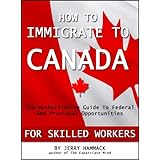I watched last night with millions of others in Canada and the U.S. as a sea-change occurred in Canadian politics. Stephen Harper and his Tories achieved a majority in Parliament; Jack Layton's NDP took over Quebec and more than doubled their number of seats, becoming the official opposition; and Michael Ignatieff both lost his seat and saw his Liberal party decimated in the process - reduced by 31 seats in the GTA alone. And let's not forget Elizabeth May becoming the first member of the Green Party to be elected to office in all of North America.
So what does this mean to immigration? Unfortunately, it can be viewed as a validation by Canadian voters of the Harper/Kenney policies which have increasingly focused on immigration primarily as an economic driver for the economy. In this model, issues of family reunification have been set aside in favour of a focus on temporary and skilled workers who come into Canada with minimal risk (usually with a job in hand) and in the case of temporary workers, minimal commitment.
On the plus-side, the NDP will hold the Tories to the fire and to the spirit of Canada's core immigration values. Layton will be a vocal critic when Harper and his cronies stray too far. But the trouble Layton will face is that with the Tories in majority, the NDP has no practical power - yet.
Canada's leaders do have a history of being responsive to their population. With that in mind, even if you don't agree with the results of the election the best thing you can do is stay in touch with your Member of Parliament and let them know which policies you believe they should support. If you are an immigrant and citizen, you can help others who are currently in the shoes you once were by advocating fair and balanced immigration policy.
I am looking forward to a few years down the line when I will be able to vote in Canadian elections and put my vote where my mouth is. Canada's great democracy underwent a sea-change last night. It will be exciting to see how this new future develops.
So what does this mean to immigration? Unfortunately, it can be viewed as a validation by Canadian voters of the Harper/Kenney policies which have increasingly focused on immigration primarily as an economic driver for the economy. In this model, issues of family reunification have been set aside in favour of a focus on temporary and skilled workers who come into Canada with minimal risk (usually with a job in hand) and in the case of temporary workers, minimal commitment.
On the plus-side, the NDP will hold the Tories to the fire and to the spirit of Canada's core immigration values. Layton will be a vocal critic when Harper and his cronies stray too far. But the trouble Layton will face is that with the Tories in majority, the NDP has no practical power - yet.
Canada's leaders do have a history of being responsive to their population. With that in mind, even if you don't agree with the results of the election the best thing you can do is stay in touch with your Member of Parliament and let them know which policies you believe they should support. If you are an immigrant and citizen, you can help others who are currently in the shoes you once were by advocating fair and balanced immigration policy.
I am looking forward to a few years down the line when I will be able to vote in Canadian elections and put my vote where my mouth is. Canada's great democracy underwent a sea-change last night. It will be exciting to see how this new future develops.


No comments:
Post a Comment